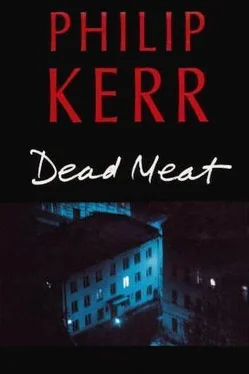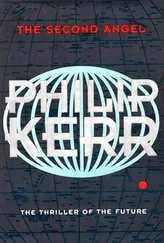There was a murmur of outrage and disbelief. Another hand went up.
‘Won’t you be recognised through the windscreen, sir?’
‘No, the windscreen is protected by armoured louvres.’
Another hand,
‘After the realisation, what’s going to happen to all that meat?’
‘I’m glad you’ve asked me that,’ said Grushko. ‘On no account must anyone touch any of the meat.’
There was a loud groan of disappointment at this particular piece of news. Grushko raised his voice.
‘The meat is radioactive,’ he said. ‘Let me be quite clear about this: the meat is unfit for human consumption.’
‘That never stopped anyone,’ quipped someone.
‘It may look all right,’ Grushko continued, ‘but, to quote an old saying, “never believe what you can see with your own eyes.” I discussed the matter with General Kornilov and he agrees with me that the best thing would be if Anglo-Soyuzatom Transit were to dispose of the meat in the same way that they already dispose of other nuclear waste. So let’s leave it to the experts, shall we?’
In another place, at another time, we might have been more shocked to discover the whole character of the crime that had brought about the death of Mikhail Milyukin. This cynicism is not just attributable to our low expectations of the Mafia. It is also referable to our inherent national distrust of the most ordinary commodities. For everyone except foreigners, the consumption of food and drink has become increasingly hazardous. Even something as ordinary as water is not to be relied upon: nobody is ever foolish enough to drink the tea that is laughingly called tap-water without boiling it very thoroughly. The same caution cannot be said to apply to alcohol substitutes, however, which annually claim the lives of thousands of people.
Food scares are common enough. Just before I went to St Petersburg, Muscovite health-inspectors had found dead dogs and cats being sold as rabbit meat in the Rozhdestvenska Street market. And most people are becoming used to the sight of reporters from national TV filming Chernobyl chickens — the radiation-mutated two-headed variety — in the state meat markets.
High levels of pesticides and nitrates mean that fruit and vegetables are no less hazardous than meat. One radio journalist has estimated that a person can commit suicide by eating fifteen cucumbers. Many shoppers carry small chemical-detection kits — strips of chemically sensitive paper that enable the housewife to take a quick toxicity reading before purchase.
Of course for many of us probably it is already too late. Our pale grey skins and red eyes, so different from those of sleek and healthy foreigners, seem to indicate as much. My own father died of cancer at the age of only forty-seven. My mother is virtually crippled with bronchitis. My sister, with whom she lives, has an incurable liver disease from years of hard drinking.
At the Central Board’s hospital in Moscow they told me that I have high blood pressure and advised me to give up salt. I said that I never touched the stuff: life was already quite bitter enough without adding any salt to it. Then the doctor charged with making my medical report listened to my lungs and suggested that I might try to cut down on my smoking. He had a cigarette in his mouth at the time. I had read about this thing in the West called ‘passive smoking’ and asked him if he had heard of it.
Just being around Russian cops, I told him, was probably worth about a packet of twenty a day.
Nobody thinks long-term any more. You take your pleasures where and when you can find them. As we all left the briefing-room I heard several men from the OMON squad joke that, radioactive or not, meat was still meat and that it might just be worth the risk to taste a good bit of British beef. At least I assumed they were joking.
One of the three vans that had been earmarked for the realisation was found to be completely unroadworthy, and there was no time to get a suitable replacement. Thus it was that I found myself sitting in an Intourist coach parked a short way off the M20, just south of Gatcina. Grushko didn’t seem to mind. He said nobody would expect the militia to use a tourist bus to mount an operation against the Mafia.
‘Besides,’ he added, ‘it’s air-conditioned and we can listen to the radio. There’s no telling how long we’ll have to sit here.’
Several times during the next hour or so I saw him look at his watch and I wondered how much his wife’s dinner party was on his mind. A look at my own watch seemed to confirm that he wasn’t going to be just late for dinner. He stood in danger of missing it altogether.
A policeman’s lot. I thought about all the occasions on which I had let my own family down and for the first time since leaving Moscow it didn’t seem so hard to see why my wife had started an affair with the music teacher. At least he would never be late for dinner. It was true what they said: sometimes the only things that made the job worthwhile were the people you did it with.
The OMON squad commander, Lieutenant Khlobuyev, stared hard at his walkie-talkie as if willing Captain Novdyrov to call in and report that the convoy was on its way to us. Nikolai smoked another cigarette and tapped his big foot in time with the music on the radio. The other three OMON squad officers, deprived of their usual comforting Schwarzenegger video, stared out of the windows of the coach. Dmitri checked the batteries for the video-camera with which he would film the whole operation. The bus-driver dozed behind his steering wheel: to him we were just another bunch of passengers, of lesser interest than a tour-group of Americans that might have offered him some hard currency by way of a tip. Andrei looked up from cleaning his pistol and cleared his throat.
‘A man goes into his local meat market and says to the butcher, “Can you cut me some very thin slices of sausage?” And the butcher says...’
Several of us came back with what the butcher said, in unison: ‘“Bring me the sausage and I’ll cut it as thin as you like.”’
‘That joke is so old,’ groaned Nikolai.
‘You tell one then,’ Andrei muttered.
‘I don’t know any jokes,’ he said. ‘Not since I lost my memory. By a coincidence, though, it happened when I was standing outside my local meat market, just the other day. D’you know, I looked in my empty shopping bag and I swear I couldn’t remember if I was about to go in the shop, or if I had just walked out of it.’
Even Grushko smiled at that.
The walkie-talkie crackled in Khlobuyev’s hand. But it was only Lieutenant Khodyrev to say that the Department of Health had found samples of the contaminated beef in the Kallininsky, Zverkovsky, Vasilyostrovsky and Kuznechny cooperative markets. Everyone was silent for a moment, but before the news could quite sink in Novdyrov had contacted us to say that the convoy was passing him even as he was speaking.
Grushko drew his gun.
‘All right, everyone,’ he said. ‘This is it. Let’s get into position.’
The bus-driver sat up and operated the automatic doors and switched off the radio. Those of us, myself included, who were staying on the bus watched as Grushko, Nikolai, Khlobuyev and one of his men climbed down the steps and crept forward to the line of trees that screened us from the road. They had chosen their spot for the ambush well. Between the trees and the four-lane highway was a short area of waste ground, long enough on which to have parked not one but several trucks.
I picked up my walkie-talkie handset and called Sasha. He and two van-loads of the OMON squad were waiting somewhere on the M10 where it entered St Petersburg parallel with the M20.
‘The convoy’s on its way to us,’ I told him. ‘Stand by.’
Читать дальше












